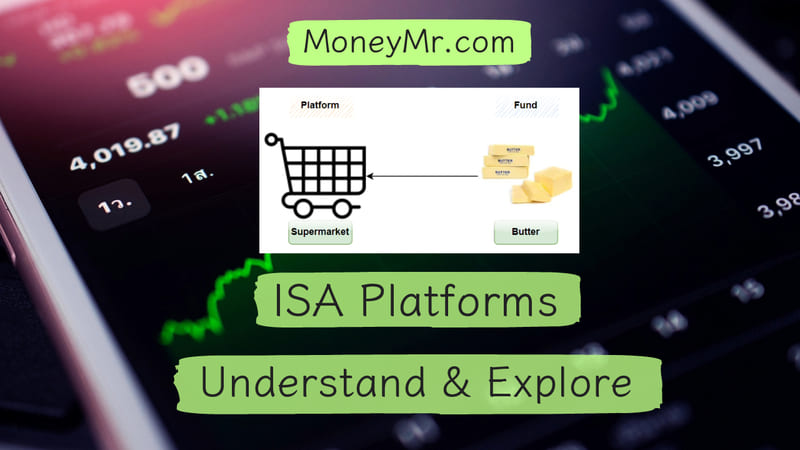ISA platforms
In this blog we will understabd what is ISA platforms and explore more.
The most cost-effective method for opening a stocks & shares ISA is by utilizing a website commonly referred to as a ‘platform.’
Stocks & shares ISAs are available from various providers, including banks and building societies. However, for the purpose of cost efficiency, this guide primarily focuses on using a website, often known as a ‘platform.’
Also Read – stocks and shares ISAs
How to invest in stocks & shares ISA
Investing in a stocks & shares ISA involves a two-step process:
- You initially need to select the provider from whom you wish to purchase your ISA.
- Subsequently, you must decide on the specific investments to include in your ISA.
This process can be likened to buying butter in a supermarket.
- First, you choose the store from which you want to buy the butter (similar to selecting the platform to use).
- Then, you make your selection from the available butter options (equivalent to choosing your funds or other investment types).
Keep in mind that there are fees associated with both using the platform and purchasing/holding the funds. To extend the analogy, think of it as different supermarkets charging varying prices for their shopping bags.
Some supermarkets offer cheaper bags, while others may have the most economical butter prices. Therefore, it’s essential to consider both factors when making your decision.
Additionally, it’s worth noting that while the platform fee is imposed by the chosen platform, the company managing the funds you select will also levy charges for their services.
Platform and Funds Cost
Both, the platform you use and the funds in which you invest come with associated costs, so it’s vital to be aware of the fees you’re paying. Investing always incurs expenses, and the key charges to be mindful of include:
- Platform Charge: This can be likened to purchasing a carrier bag at a supermarket. Some platforms charge a fixed fee (which may be more suitable for those with substantial investments), while others charge a percentage of the total value of your funds. As your investments grow, the platform charge may also increase.
- Fund Manager Charge (Annual Management Charge): You’ll incur fees for everything you place in that “bag,” which, in this context, refers to the funds you invest in. This charge is imposed by the manager of the fund held within your stocks & shares ISA. It is typically expressed as a percentage of the amount you have invested in that specific fund and can vary from 0.05% to 1% or more, depending on the fund you choose.
- Buying and Selling Funds and Shares: Every time you purchase or sell a fund or a shareholding on the platform, there is a cost associated with it. These fees can range from £0 to £25. If you plan to select funds and hold onto them without frequent trading, the impact of this charge may be less significant. However, if you are an active trader, seeking a platform with lower trading charges should be a priority.
- Transfer-Out Fee: This fee comes into play when you decide to move your stocks & shares ISA from one platform (provider) to another. Typically, it is applied per fund, so if you have multiple funds within your stocks & shares ISA, the cost will increase accordingly.
However, it’s worth noting that you often have the option to sell your investments and transfer the proceeds as cash, which is typically free to do. Keep in mind that you may still incur a trading charge when you sell your investments.
Choose platform wisely
Just like with any other financial product, it’s essential to keep a close watch on the charges to ensure you’re not paying more than necessary.
Once you have a good understanding of the various fees involved, it becomes easier to determine whether your chosen stocks & shares ISA provider might be charging you excessively.
It’s advisable to make it a routine to regularly review and assess your fees and charges to ensure you’re securing the most favorable deal.
Even if a platform initially appeared to be cost-effective, changes in their pricing structures could mean that it’s no longer as affordable.
Therefore, it’s crucial to also examine any exit fees if you’re considering switching to a different provider. In the long term, if the potential cost of switching isn’t too substantial, it’s likely to be more economical to move to a provider with lower fees.
Transfer to another stocks & shares ISA
You have the option to transfer your existing stocks & shares ISA to another platform, but be cautious about potential exit fees.
If you currently hold a stocks & shares ISA and are considering moving to one of the platforms listed below to benefit from reduced charges, it’s essential to factor in any exit fees that your current platform might impose before initiating the transfer.
Should you decide to switch to one of the platforms mentioned, you will need to perform an ISA transfer. However, it’s important to note that the new platform may not provide all the investment choices available on your current platform.
Therefore, if you have a specific fund that you prefer to invest in, you must weigh the pros and cons of sticking with your current platform, which still offers that fund, against moving to a new platform with lower fees.
How to overcome risk
If you’ve reached a point where you no longer wish to take any financial risks, you have the option to transfer your stocks & shares ISA into a cash ISA.
This can be particularly relevant for individuals approaching retirement or anyone else seeking a more conservative approach to managing their money.
To make this transition, you’ll need to get in touch with your new cash ISA provider and inform them of your intention to transfer funds from your stocks & shares ISA.
It’s crucial not to simply withdraw the money from your stocks & shares ISA, as doing so would result in the loss of all the tax-free benefits associated with the ISA.
Once you’ve initiated the transfer request, it may take a few weeks to complete the process. If you are opening a cash ISA with a different provider than your stocks & shares ISA, you are likely to incur a closing fee. However, if you are transferring within the same provider, there is typically no fee involved.
Who are legal owner?
When you purchase shares through a platform, you typically do not become the legal owner.
Instead, you pay the platform to acquire the shares on your behalf. This method offers the advantage of allowing you to buy fractional shares, which might otherwise be too expensive.
However, it’s essential to understand that the legal ownership of the shares is typically held by either the platform itself or a nominee company, while you assume the role of a beneficiary owner.
In the unlikely event of the platform facing financial difficulties, you wouldn’t have direct control over your shares. Instead, your assets, such as shares or funds, would either be transferred to another brokerage or sold, with the resulting cash returned to you.
To mitigate this risk, most platforms practice the separation of your assets from their own, a practice known as ringfencing. This separation theoretically ensures that even if the platform encounters financial issues, they would not have access to your assets.
Know about ISA allowance
ISA allowance doesn’t carry forward into the next tax year, which means it’s a “use it or lose it” situation. In other words, you need to invest in your stocks & shares ISA by 5th April, marking the end of the tax year, for it to count toward that year. Importantly, any portion of your allowance that goes unused (the £20,000 allowance for 2023/24) does not roll over, so if you don’t utilize it, you forfeit it permanently.
Any savings or investments held within the tax-free ISA ‘wrapper’ will continue to accumulate interest and enjoy the associated tax advantages until you decide to withdraw the funds.
As a result, it’s entirely feasible to have a significant sum invested within ISAs. Some individuals have accumulated over £200,000 in ISAs since their introduction in 1999, although the total amount may vary based on the performance of your investments.







